Island Residents
Percy Islands’ custodians have a longstanding commitment to manage the Island to care for the Island ecology. Conservation is at the heart of the Island’s activities by utilizing the Island resources through sustainable management practices.
Naturally, the traditional Island hospitality set up by the Andy and the Hicklings, continues to flourish. Walkers are always welcome, but due a busy schedule, the Homestead has appointed times for gathering on the veranda and a chat.
If anyone is keen to help out in the chores, you are welcome to help us as many hands makes light work. Please, can you radio Ch:73 to enable prior ‘job’ preparation.
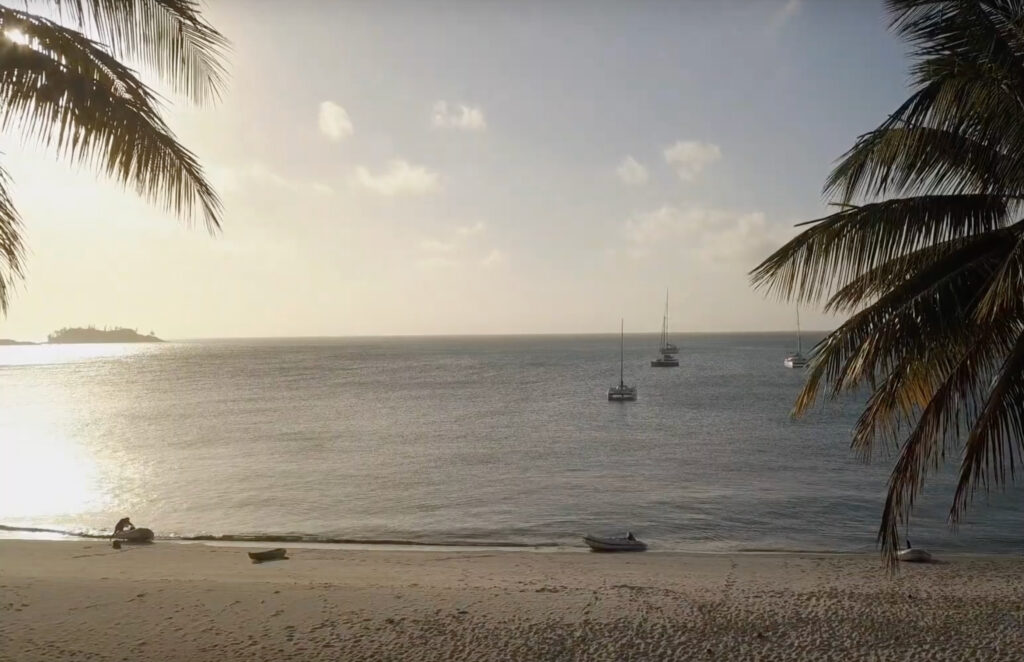
West Bay
Please take rubbish away with you, only use the custom built fire pit and BBQ at the rear of the A-frame. Keep the kitchen tidy please and wash up with sea water.
Ensure that the fire is kept under control at all times; dunes and the tracks to the Homestead and Apiaries are covered in native timber; an extremely volatile fire risk.
IMPORTANT: BBQ/FIRE PIT embers must be dealt with by sea water-bucket provided.
TO PROTECT the Island from FIRE resulting in evacuation of residents and the end of an era.
Volunteers
can play a crucial role in helping to keep people safe, by not standing under a coconut tree and risk getting hit by a weighty nut. Also, by tidying up the beach and stacking palm fronds ready for the mulching machine, sticks for fire pit, coconuts, taking rubbish with you and no fires on the beach or campsites except in the Fireplace provided behind the A-Frame.
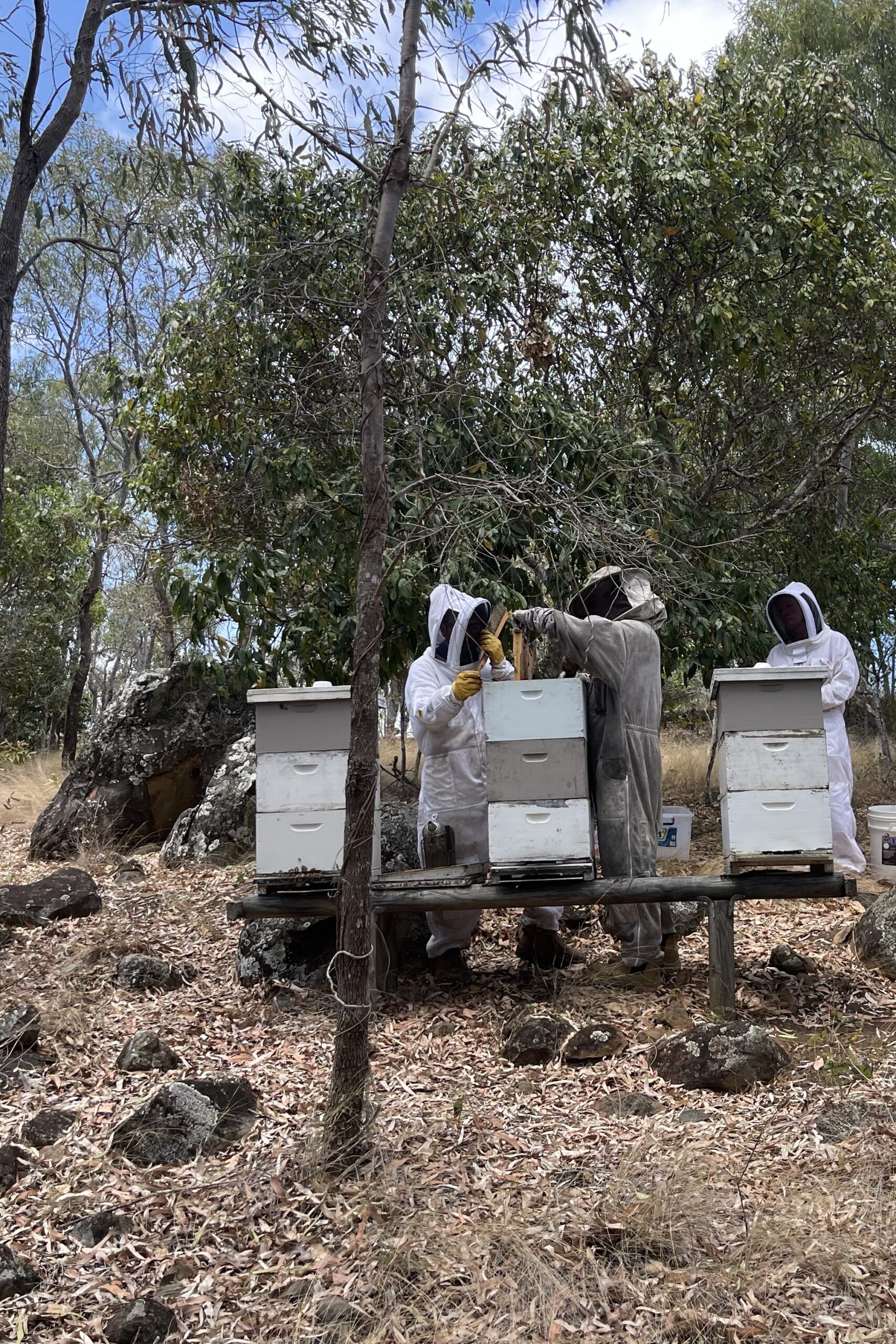
Percy Island Honey Bees
The Percy Island bees are managed in 3 Apiaries; behind the Homestead, near the Rondarval and at the seasonal creek near the airfield. Please let a resident know if you are allergic and ensure that you have your medication with you. The Homestead has Medical Kit if medical help is required for Anti-histamine (but no Epipen) please contact the Homestead on Marine Ch: 73
The famous Percy Island honey is made by the amazing Golden Italian bees as they pollinate the plants while collecting nectar. They were brought in by Andy Martin in 1970s and also help us to grow the garden by pollinating the crops. They do not seem to compete with the 6 or species of native bees seen in the gardens and about the Island. The native vegetative regrowth has been during the last 65-70 years since the ringbarking of trees ceased and the 2,000 wool sheep were sold with the Whites retiring in 1964. Andy Martin took up residency and another era begun.
Here are some ways that you can help preserve bees that pollenate 60% of our Agricultural crops. Also other pollinators are native bees, hoverflies, wasps, butterflies, beetles, flies, thrips, and moths:-
- Protect and restore habitats.
- Plant native nectar-bearing flowers in your garden or balcony.
- Offer a shallow bowl of water, at waist height, with a stick or rock for insects to climb out.
- Buy honey and other hive products from your local beekeeper.
- Raise awareness about the importance of bees, educate children.
- Set up a pollinator farm in your garden or on your balcony.
- Only use pesticides that do not harm bees, spray in windless weather, either early in the morning or late at night when bees return to the hive.
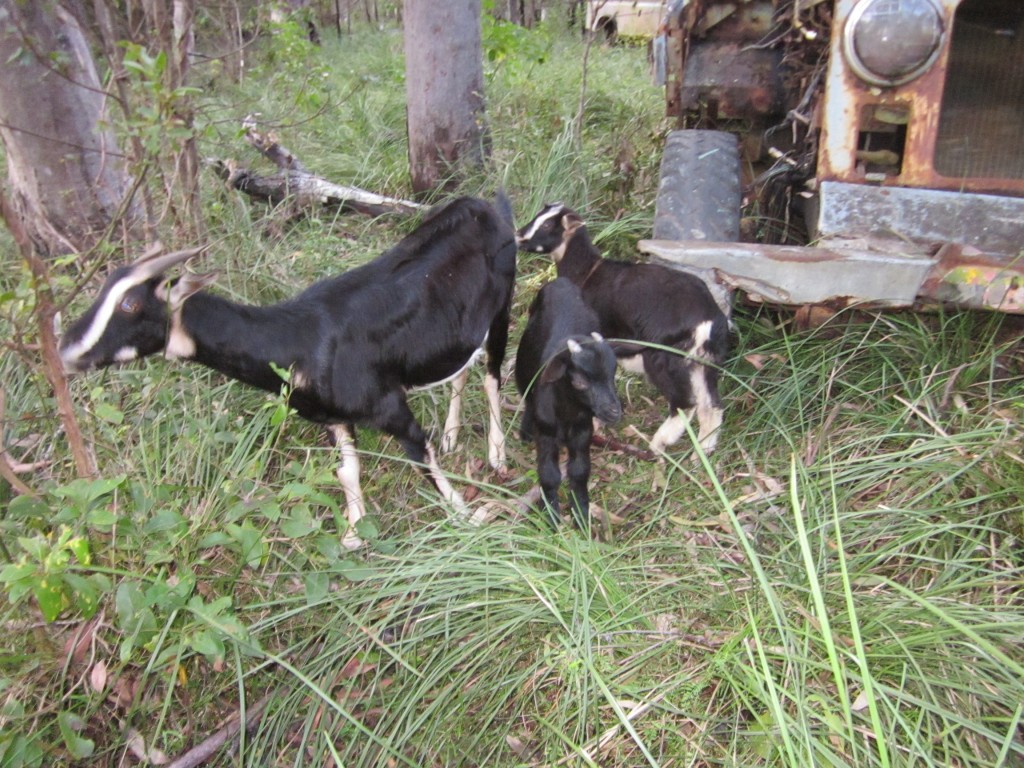
Percy Island Colonial Goats, Introduced in 1874
Home to the rangeland managed Colonial Percy Island Heritage Goats, which were recently recognized as having unique DNA; due to the geographic isolation after their introduced to the island in 1876 by Capt. Bedwell of the Royal Navy survey ship Pearl. The 12 goats were put on the Island to feed sailors, and after 1876, the residents also which they still do.
Interestingly, the Doe in the photo above, through a girl in her coloring, and a twin which was all-black. This is indicative of the Indian Bengal Goats that must have been picked up by colonial ships from India. The other interesting twin combination from a similar Doe was the all-white boy and black and white female. The All-Black does also throw varied colours.
Due to their browsing habits and eating dead leaves, the goats are wonderful at aiding in fire control and weed management by eating introduced the Prickly Pear, Snakeweed etc.
The Percy goats are therefore deserving of protection and management and are a vital part of the pioneering heritage values of the Island. These little goats are easily tamed and are recognized by the Rare Breed Trust of Australia and the Australian All Breeds of Miniature Goat & Sheep as described on the website for the Colonial Percy Island goats

Green Turtle Nesting
Nesting season is November through to March, with hatching mostly from January- April. At Middle Percy Island, turtle nests can be found at West Bay and rarely at Whites Bay. At West Bay, the island residents will secure the area, roping off each nest to protect the eggs during their 6-8 week incubation period. This timing depends upon the nest site and temperature, which result in male or female hatchlings.
Only 1 in 1,000 hatchlings make it to an adult of 30-40 years, that can return to this beach to nest herself to keep the circle of life going. Please KEEP CLEAR OF NEST SITES thank you
We are pleased to share that a nest has been laid on the 18th November, 2024, at West Bay, Percy Island, in front of the Telephone Shed. See image below, there are two nests, one low on the sand dune and one on top, a false nest the turtle was unable to dig the depth required for her eggs to incubate properly. First week in December, there were 2 more nests laid. Each female adult can lay every 2 weeks multiple times during the laying season.
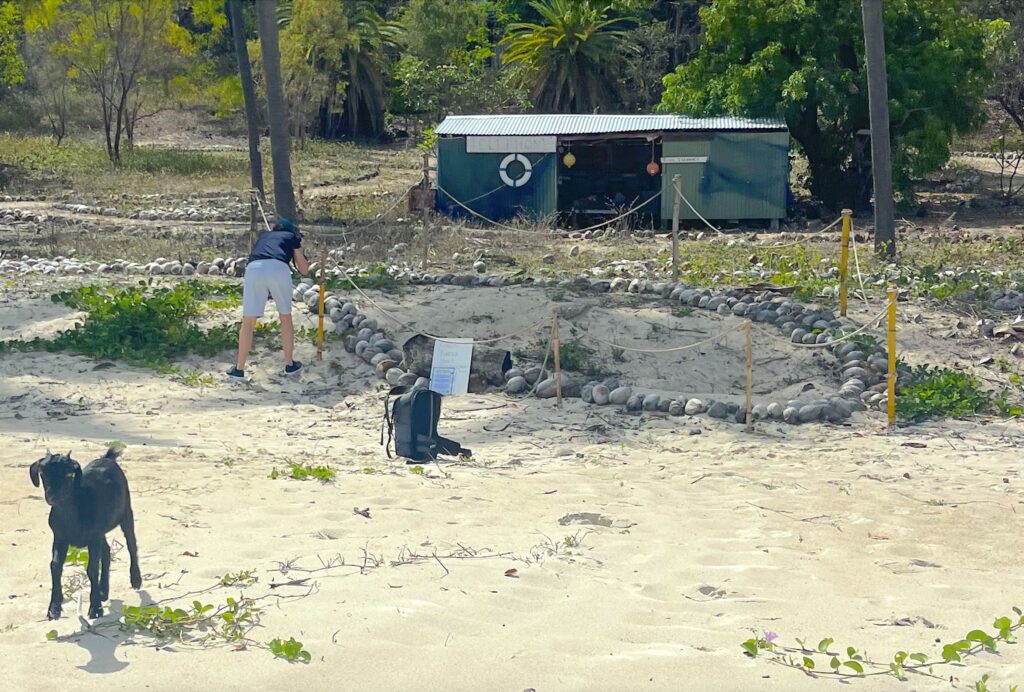
Please keep dogs on a leash at all time. Visitors are asked to look but don’t touch the turtle nests, eggs or hatchlings, and always supervise young children, educating them on the importance of not interfering with nature is essential.
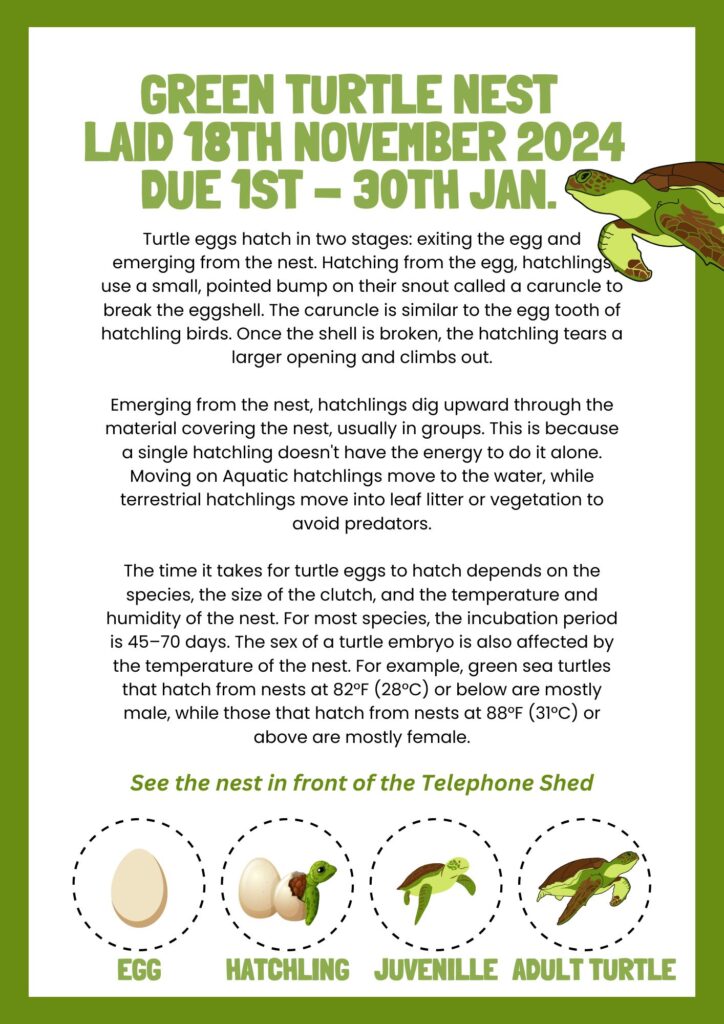
Volunteers can also confirm sightings of Green Sea Turtles from November onwards. Six threatened species of Australian turtles are known to frequent Queensland beaches.
Turtles are protected under the Environment Protection and Biodiversity Conservation
Act 1999 (EPBC Act). The Nature Conservation Act 1992 (NCA) also protects
threatened marine turtle species and grey nurse sharks, whales, porpoises,
dugongs, turtles and dolphins are protected under the Nature Conservation Act
1992 – these are no-take species in Queensland waters.
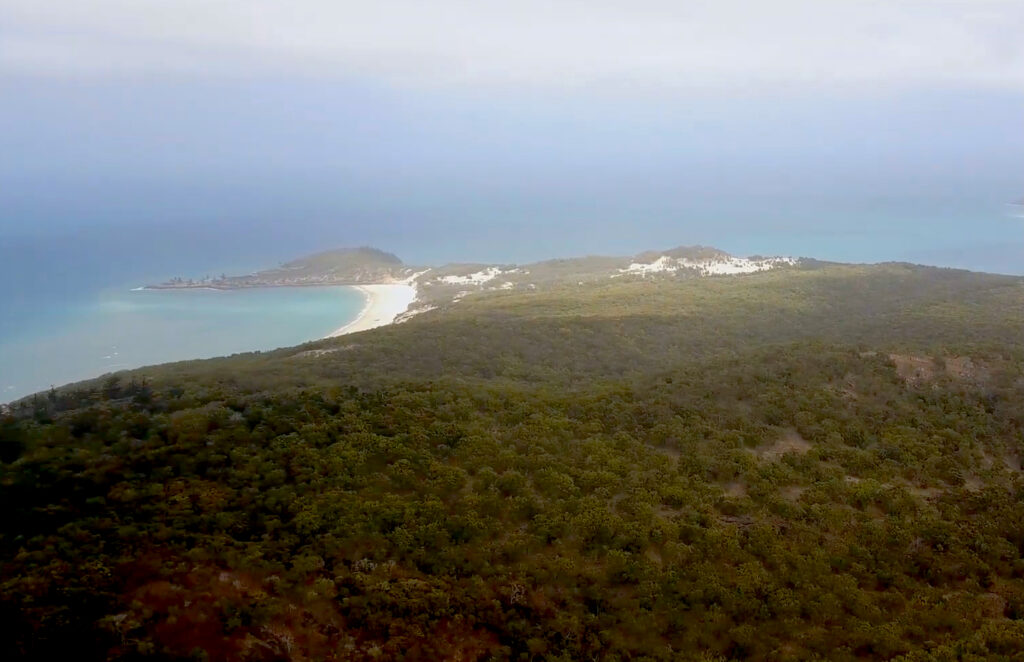
There is NO Hunting permitted on Percy Island.
Only the caretakers are permitted to hunt as a means to provide food for the Islanders living off-grid, and from time to time providing Percy Islands famous goat stew for guests.
No-take species recorded by the Queensland Government
The following species are no take. If accidentally caught on the Island, please immediately and carefully returned to the water.
Yabby – females carrying eggs or young are no take
Mud crab – (females are no take)
Oysters – you can only take pearl oysters away from a public oyster reserve or unlicensed oyster ground, you must eat all other oysters where you catch them
